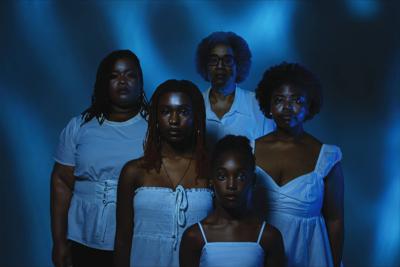We often think of environmental disasters in terms of stark government statistics and financial impact. But with Erika Dickerson-Despenza’s potent drama cullud wattah, we are forced to reckon with the very real human cost of such tragedies.
Premiering off-Broadway at The Public Theater in 2021, cullud wattah follows three generations of Black women as they struggle to navigate the horrors of the water crisis in Flint, Mich., in 2016. Exploring heavy themes of environmental racism, generational trauma, Black sacrifice and survival, it’s just the sort of meaty work on which Street Theatre Company has built its reputation.
“Programming cullud wattah this season was not just a curatorial decision, it was a moral imperative,” says Street’s executive artistic director Randy Craft. “Erika Dickerson-Despenza’s searing and poetic work confronts the Flint water crisis with unflinching honesty, while centering the voices of Black women — whose resilience and rage deserve to be witnessed. This play challenges us to look at the systems we live under, and the cost of their failures on real families. As a theater committed to truth-telling, cullud wattah speaks directly to our mission and the times we live in.”
Of course, such a hard-hitting piece requires a keen eye and an urgent approach to storytelling. It’s no surprise then that Craft would ask Alicia Haymer to direct the play, which opens Sept. 12 at The Barbershop Theater.
“I can’t think of a more perfect human in Nashville than Alicia Haymer to direct this piece,” Craft says. “Alicia has a rich history as an artist for her honesty and poignancy, which is exactly what this piece calls for. Erika has written five strong women, navigating an impossible situation, and Alicia’s strength shines through every inch of this piece. I’m so excited for Nashville audiences to once again see a challenging work that otherwise would not have made it to this city.”
Like Craft, Haymer says she immediately connected with cullud wattah’s powerful subject matter and deep, intergenerational story.
“I love stories that have a social justice skew to them, so when I first read the synopsis, I was immediately intrigued,” says Haymer, a frequent Street collaborator who most recently directed last season’s excellent Next to Normal. “I also have siblings who live in Flint. So to have loved ones who’ve experienced this crisis firsthand, I knew this was a story I really wanted to tell.”
Haymer also was struck by the play’s lyrical language — including the colloquial twist of its title — and the use of magical realism to highlight key themes.
“I always enjoy exploring these kinds of magical elements,” she says. “As a director, I feel like it just gives us so much more opportunity for creativity. I mean, everything doesn’t have to be so literal. This is such a beautiful, well-written script, and I love that the playwright gives us permission to really lean into Afro-surrealism. There are moments where time sort of shifts, and we’re clearly in a different realm — really haunting moments that represent grief or transition or otherworldly energy.”
To capture such stage magic, Haymer has enlisted the help of designer Garner Harsh — who created the evocative scenery for last season’s Alice by Heart. She has pulled together an ensemble of new and familiar talent, including Jamya Conner, CJ de Solonel, Cherie Hall, Prichan Murrell and Jordan Nixon.
Haymer says it’s been “an incredible honor to watch this cast work.” But one scene that she’s especially excited about involves the family’s matriarch Big Ma and her granddaughter Reesee.
“Big Ma’s character is so interesting,” Haymer says. “She presents as this rigid woman, who doesn’t tolerate anything that isn’t rooted in Christianity. So I’m very excited for the audience to get to see another side of her, as she attempts to relate to her granddaughter. It’s such a beautiful moment that reminds us that we can have different beliefs and ideas, but still show compassion to each other.”
Though cullud wattah offers no easy answers, Haymer is eager for the conversation.
“Sometimes, as artists, it’s like, ‘Well, what can I do?’ I don’t have a lot of money. I don’t have any pull in the government to get bills passed. But I do have a voice. And honestly, I think we have a real obligation to reflect the times that we live in. So while it’s an honor to bring joy during tough times, I think it’s also our job to tell the truth about the world. I’m really grateful for this opportunity to tell this story, and I can’t wait to take audiences on this journey.”





